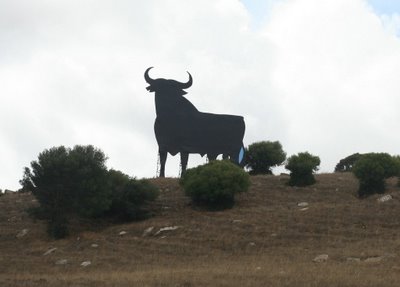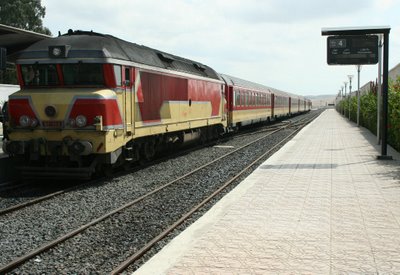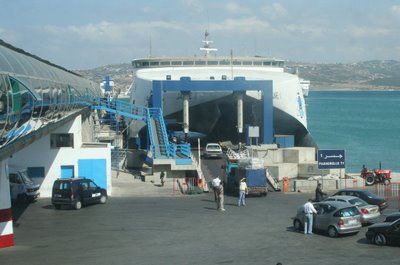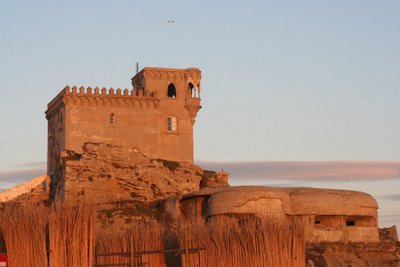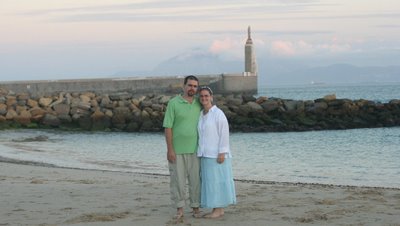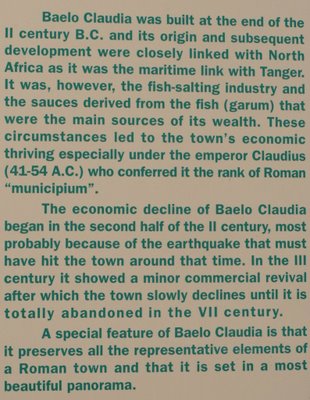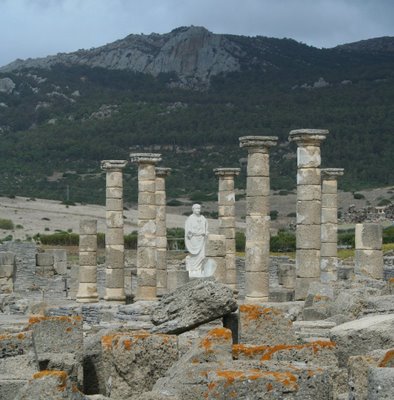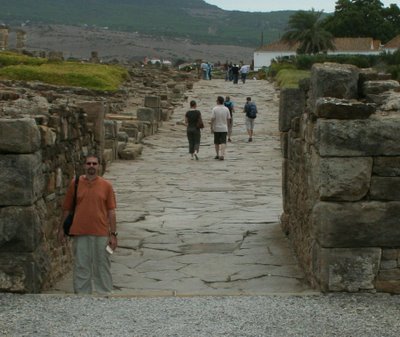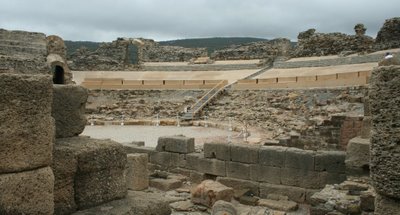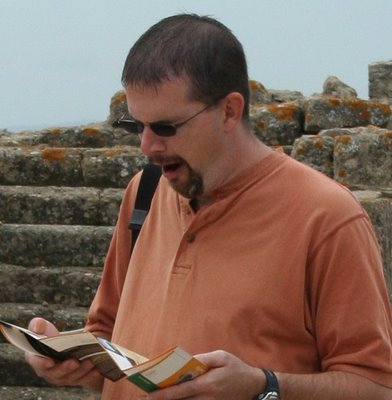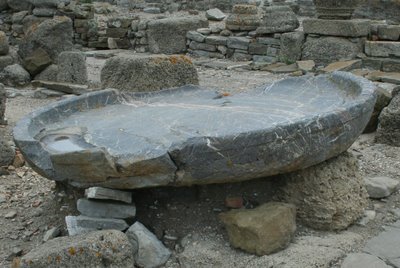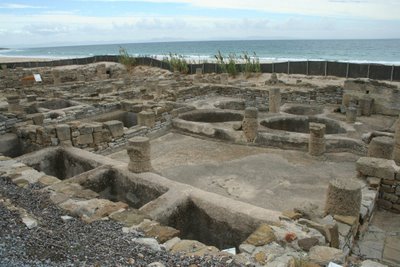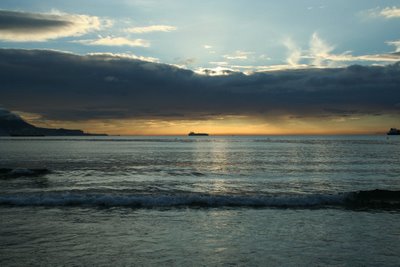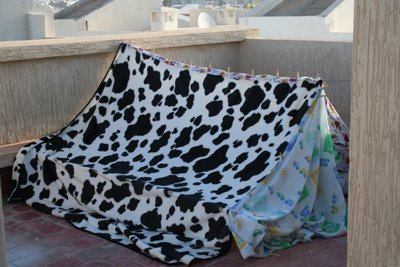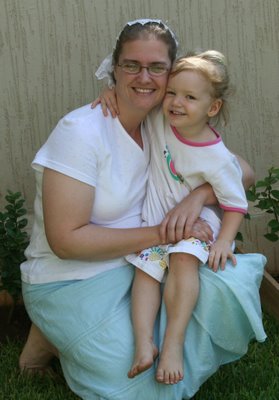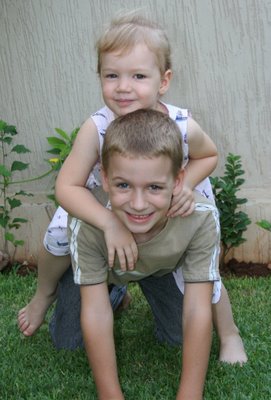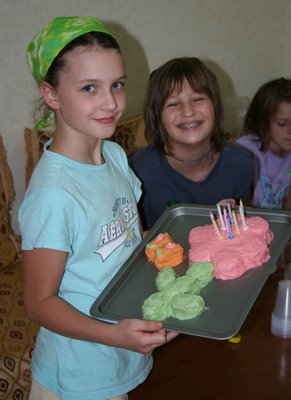Friday, September 29, 2006
Ferry- We waited 2 hours to leave on our 40 minute Ferry ride. We then took a 45 minute bus ride to Algeciras, Spain-where we stayed.
Thursday, September 28, 2006
Monday, September 25, 2006
Interesting facts- We have entered the month of Ramadan
Importance of Ramadan for Muslims
Muslims believe that during Ramadan, the revelation of the Qur'an to the Prophet Muhammad began. The entire month is spent fasting from dawn to dusk. Fasting during this month is often thought to figuratively burn away all sins. Furthermore, the Prophet Muhammad told his followers that the gates of Heaven would be open all the month and the gates of Hell would be closed. The first day of the next month is spent in great celebrations and rejoicings and is observed as the ‘Festival of Breaking Fast’ or `Eid ul-Fitr.
Practices during Ramadan
There are some variations regarding the time in which Ramadan's fasting takes place for different muslims around the world. Since the festival is linked to the lunar calendar and the new moon is not in the same state at the same time globally, it would depend on which lunar sighting that individual recognises.
Fasting
The most prominent event of this month is the fasting practiced by all observant Muslims. The fasting during Ramadan has been so predominant in defining the month that some have been led to believe the name of this month, Ramadan, is the name of Islamic fasting, when in reality the Arabic term for fasting is sawm.
Ramadan Dinner known as IftarEating, drinking and smoking are not allowed between dawn (fajr), and sunset (maghrib). During Ramadan, Muslims are also expected to put more effort into following the teachings of Islam by refraining from violence, anger, envy, greed, lust, angry and sarcastic retorts, and gossip. Sexual intercourse during fasting in the day is not allowed but is permissable at night (extramarital sexual intercourse is not allowed in Ramadan or at any other time). People are meant to try to get along with each other better than they normally would. All obscene and irreligious sights and sounds are to be avoided. Purity of both thought and action is important. The fast is an exacting act of deep personal worship in which Muslims seek a raised level of closeness to God. The act of fasting is said to redirect the heart away from worldly activities, its purpose being to cleanse the inner soul and free it from harm. Properly observing the fast brings on a comfortable feeling of peace and calm.
Fasting during Ramadan is not obligatory for several groups for whom it would be excessively problematic. Children before the onset of puberty are not required to fast, though some do. However, if puberty is later than is normally expected, fasting becomes obligatory for males and females after a certain age. According to the Qur'an, if fasting would be dangerous to someone's health, such as a person with an illness or medical condition (this can include the elderly), that person is excused. For example, diabetics and nursing or pregnant women are not usually expected to fast; but they are encouraged to feed a needy person instead[1]. According to hadith, observing the Ramadan fast is not allowed during menstruation period for women; still they (women) must make up these days they didn't fast during their menstruation period. Other individuals for whom it is usually considered acceptable not to fast are those in battle and travelers who intend to spend fewer than ten days away from home. If one's condition preventing fasting is only temporary, one is required to make up for the days missed after the month of Ramadan is over and before the next Ramadan arrives. If one's condition is permanent or present for an extended period of time, one may make up for the fast by feeding a needy person for every day missed.
If one who does not fit into one of the exempt categories breaks the fast out of forgetfulness, the fast is still valid. If, however, one intentionally breaks the fast, that individual must continue fasting for the remainder of the day but then make up for the entire day later in addition to a "penalty" (kaffara) which can be in one of three forms: fasting for 60 consecutive days[citation needed], feeding 60 people in need, or freeing a slave (the practice of freeing slaves is obviously outdated). If one breaks the fast through consensual sexual intercourse, the transgressor must make up for the day lost while also choosing one of the above penalities.
Laylat al-Qadr
Laylat al-Qadr is the night that the first verse of Quran was read to Prophet Muhammad (s). Nobody knows exactly which night in Ramadan is Laylat al-Qadr (the Night of Power), only that it occured in one of the last ten nights of Ramadan but especially on the odd-numbered dates between 21st and 29th, with the 27th being the most likely. It is said that when one seeks the Laylat al-Qadr, his/her sins will be erased, and it will be as if he/she has just been reborn. Many hadiths also affirm the great value of praying during Laylat al-Qadr.
Tarawih
During this month, extra optional prayers of eight to twenty raka'ah, called tarawih, are prayed each night in the mosque by Sunni Muslims. For those praying at the mosque throughout the month of Ramadan, the whole Quran is recited during this month. By the end of the month, the Imam reads the last chapters of the Quran. Although, it is not required to pray Tarawih together at a mosque for Sunni Muslims, it is recommended.
Suhoor
Most practicing Muslims, especially children and the elderly, have a light meal or snack before dawn. This light meal is called Suhoor or Sohoor, and is considered an act of Sunnah. This tradition is practised by Muslims worldwide. Cafes and restaurants, in Muslim countries, stay open till early morning hours in Ramadan to serve food and drink for Suhoor
This information was taken from http://en.wikipedia.org/wiki/Ramadan
Muslims believe that during Ramadan, the revelation of the Qur'an to the Prophet Muhammad began. The entire month is spent fasting from dawn to dusk. Fasting during this month is often thought to figuratively burn away all sins. Furthermore, the Prophet Muhammad told his followers that the gates of Heaven would be open all the month and the gates of Hell would be closed. The first day of the next month is spent in great celebrations and rejoicings and is observed as the ‘Festival of Breaking Fast’ or `Eid ul-Fitr.
Practices during Ramadan
There are some variations regarding the time in which Ramadan's fasting takes place for different muslims around the world. Since the festival is linked to the lunar calendar and the new moon is not in the same state at the same time globally, it would depend on which lunar sighting that individual recognises.
Fasting
The most prominent event of this month is the fasting practiced by all observant Muslims. The fasting during Ramadan has been so predominant in defining the month that some have been led to believe the name of this month, Ramadan, is the name of Islamic fasting, when in reality the Arabic term for fasting is sawm.
Ramadan Dinner known as IftarEating, drinking and smoking are not allowed between dawn (fajr), and sunset (maghrib). During Ramadan, Muslims are also expected to put more effort into following the teachings of Islam by refraining from violence, anger, envy, greed, lust, angry and sarcastic retorts, and gossip. Sexual intercourse during fasting in the day is not allowed but is permissable at night (extramarital sexual intercourse is not allowed in Ramadan or at any other time). People are meant to try to get along with each other better than they normally would. All obscene and irreligious sights and sounds are to be avoided. Purity of both thought and action is important. The fast is an exacting act of deep personal worship in which Muslims seek a raised level of closeness to God. The act of fasting is said to redirect the heart away from worldly activities, its purpose being to cleanse the inner soul and free it from harm. Properly observing the fast brings on a comfortable feeling of peace and calm.
Fasting during Ramadan is not obligatory for several groups for whom it would be excessively problematic. Children before the onset of puberty are not required to fast, though some do. However, if puberty is later than is normally expected, fasting becomes obligatory for males and females after a certain age. According to the Qur'an, if fasting would be dangerous to someone's health, such as a person with an illness or medical condition (this can include the elderly), that person is excused. For example, diabetics and nursing or pregnant women are not usually expected to fast; but they are encouraged to feed a needy person instead[1]. According to hadith, observing the Ramadan fast is not allowed during menstruation period for women; still they (women) must make up these days they didn't fast during their menstruation period. Other individuals for whom it is usually considered acceptable not to fast are those in battle and travelers who intend to spend fewer than ten days away from home. If one's condition preventing fasting is only temporary, one is required to make up for the days missed after the month of Ramadan is over and before the next Ramadan arrives. If one's condition is permanent or present for an extended period of time, one may make up for the fast by feeding a needy person for every day missed.
If one who does not fit into one of the exempt categories breaks the fast out of forgetfulness, the fast is still valid. If, however, one intentionally breaks the fast, that individual must continue fasting for the remainder of the day but then make up for the entire day later in addition to a "penalty" (kaffara) which can be in one of three forms: fasting for 60 consecutive days[citation needed], feeding 60 people in need, or freeing a slave (the practice of freeing slaves is obviously outdated). If one breaks the fast through consensual sexual intercourse, the transgressor must make up for the day lost while also choosing one of the above penalities.
Laylat al-Qadr
Laylat al-Qadr is the night that the first verse of Quran was read to Prophet Muhammad (s). Nobody knows exactly which night in Ramadan is Laylat al-Qadr (the Night of Power), only that it occured in one of the last ten nights of Ramadan but especially on the odd-numbered dates between 21st and 29th, with the 27th being the most likely. It is said that when one seeks the Laylat al-Qadr, his/her sins will be erased, and it will be as if he/she has just been reborn. Many hadiths also affirm the great value of praying during Laylat al-Qadr.
Tarawih
During this month, extra optional prayers of eight to twenty raka'ah, called tarawih, are prayed each night in the mosque by Sunni Muslims. For those praying at the mosque throughout the month of Ramadan, the whole Quran is recited during this month. By the end of the month, the Imam reads the last chapters of the Quran. Although, it is not required to pray Tarawih together at a mosque for Sunni Muslims, it is recommended.
Suhoor
Most practicing Muslims, especially children and the elderly, have a light meal or snack before dawn. This light meal is called Suhoor or Sohoor, and is considered an act of Sunnah. This tradition is practised by Muslims worldwide. Cafes and restaurants, in Muslim countries, stay open till early morning hours in Ramadan to serve food and drink for Suhoor
This information was taken from http://en.wikipedia.org/wiki/Ramadan
Ramadan- Personal notes
We have observed that Ramadan is where the "works" of Islam really picks up speed. All of the requirements are done largely out of fear of what Allah will do to you if you don't participate and it is a chance to do a lot of good things to try and out- weigh the bad you have done.
If a Muslim in Fes, Morocco is caught breaking the fast they can get up to three months in jail.
This month gets interesting as tempers shorten and anger flares.
It is not uncommon for Muslims to gain weight during this time. During the night they gorge themselves on big meals and lots of sweets.
If a Muslim in Fes, Morocco is caught breaking the fast they can get up to three months in jail.
This month gets interesting as tempers shorten and anger flares.
It is not uncommon for Muslims to gain weight during this time. During the night they gorge themselves on big meals and lots of sweets.
Monday, September 18, 2006
You mean we were eating that and we didn't even know it!!?!
We found something very interesting out today thanks to our language helper. When we go to the store to by ground beef there appears to be a fatty beef and a lean beef. The price for the lean is more expensive so this all makes sense. The description in front of the meat is in French so your on your own.
At times we would get either. The other night we had a bunch of friends over for burgers on the grill. We got the fattier meet because it is more moist and has more flavor then the lean meant.
Today Donna and Amina(our language helper) were talking and some how they got on the subject of meat. The fattier meat IS NOT beef but in fact it is sheep. So we have been eating a lot of sheep here of late!
Brian
At times we would get either. The other night we had a bunch of friends over for burgers on the grill. We got the fattier meet because it is more moist and has more flavor then the lean meant.
Today Donna and Amina(our language helper) were talking and some how they got on the subject of meat. The fattier meat IS NOT beef but in fact it is sheep. So we have been eating a lot of sheep here of late!
Brian
Thursday, September 14, 2006
Where's the hot chocolate?
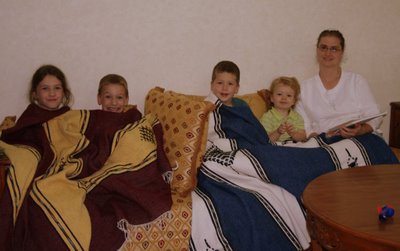
This morning we woke up to 69 degrees outside and rain for the first time in months. There was a damp air blowing. It was 75 degrees in the house when this picture was taken. We had sat down for family devotions before Donna and I left for school. The kids said they were freezing and Tori wanted to know where the hot chocolate was.
I guess that's what happens when you live for weeks on end with the temp in your house at 88 degrees, the temp outside peeking at 140 degrees, and then it drops to a cool damp 75 degrees.

